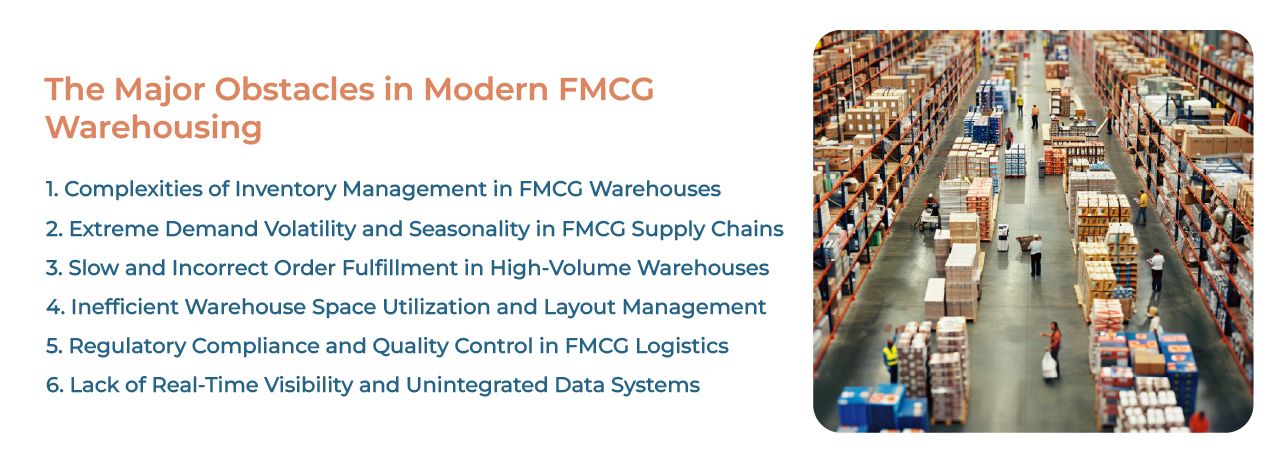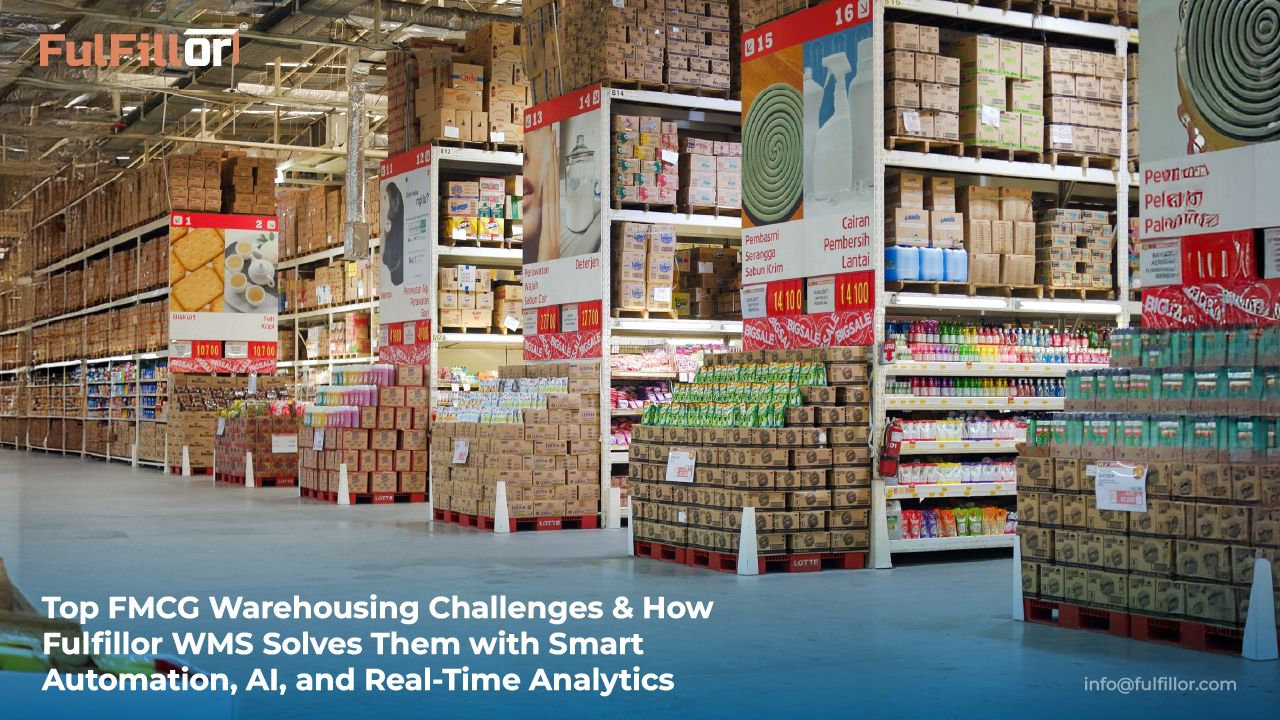Top FMCG Warehousing Challenges & How Fulfillor WMS Solves Them with Smart Automation, AI, and Real-Time Analytics
The Fast-Moving World Behind Everyday Essentials: Inside the FMCG Warehousing Revolution
In today’s rapidly evolving FMCG warehousing and logistics landscape, projected to exceed $1.2 trillion by 2025, the scale and speed of operations continue to accelerate. Studies show that nearly 60 percent of FMCG manufacturers and distributors lose revenue due to limited warehouse visibility, inaccurate demand forecasting, and inefficient inventory management.
Managing fast-moving consumer goods means tackling constant shifts in demand, perishable inventory, cold-chain storage, and regulatory compliance. Fulfillor’s intelligent FMCG Warehouse Management System (WMS) transforms these challenges into opportunities through AI-driven automation, real-time inventory tracking, batch- and lot-level traceability, and cloud-based warehouse analytics. The result is a simplified, agile, and data-driven FMCG supply-chain management solution built to meet the pace of modern commerce.
Let’s explore the top FMCG warehousing challenges and see how Fulfillor WMS turns each obstacle into operational efficiency and profitability.
The Major Obstacles in Modern FMCG Warehousing
FMCG warehousing operates under constant pressure, where high product turnover, SKU-level inventory management, and cold chain compliance meet the demand for precision, speed, and regulatory accuracy. Below are six major operational hurdles that shape today’s FMCG warehouse management and logistics landscape.

1. Complexities of Inventory Management in FMCG Warehouses
Balancing thousands of fast-moving SKUs with unique shelf lives is a juggling act. Additionally, such overproduction will lead to waste of finances and the client’s trust. When brands cannot monitor their inventory in real time and track shelf-life expiration dates accurately, they have no choice but to roll the dice on product waste or lost sales due to poor inventory visibility and batch-level traceability.
2. Extreme Demand Volatility and Seasonality in FMCG Supply Chains
FMCG demands swing with promotions, regional festivities, or viral trends. When stock is calculated incorrectly, there can be situations when a warehouse is full one month and empty the next, leading to purely reactive decision-making, which tests storage optimization, labor management, and logistics planning in high-volume FMCG distribution.
3. Slow and Incorrect Order Fulfillment in High-Volume Warehouses
Shoppers want their products almost as soon as they order them, and keeping orders both accurate and fulfilled at a certain speed is tough. As the volume of online sales rises, even small picking errors, packing delays, or last-mile inefficiencies could eat into profit margins and complicate FMCG eCommerce logistics.
4. Inefficient Warehouse Space Utilization and Layout Management
High product volumes and limited warehouse capacity make space optimization essential. Inefficient racking systems and sub-optimal SKU placement lead to longer travel time and slower throughput, which contribute to higher input costs - a major concern for low-margin FMCG warehousing operations.
5. Regulatory Compliance and Quality Control in FMCG Logistics
FMCG storage management systems need to maintain the highest level of security and safety, especially in terms of food, beverages, and drugs. If you fail to maintain temperature control, traceability, or batch history tracking, it can further lead to product recalls, regulatory penalties, and eroded brand reputation.
6. Lack of Real-Time Visibility and Unintegrated Data Systems
There are blind spots all across the FMCG supply chain due to a fragmented distribution network. Managers cannot control stock levels or forecast without a centralized operational dashboard and integrated warehouse management system (WMS), nor can they maintain efficiency across multiple 3PL partners, fulfillment centers, and multi-warehouse networks.
How Fulfillor WMS Solves FMCG Warehousing Challenges

1. Smart Inventory Management and Shelf-Life Control
Fulfillor offers comprehensive real-time tracking of inventory at SKU, batch, and lot levels with expiry alerts. It reduces waste, avoids overstock, and keeps things fresh – all of which directly benefit FMCG supply chain profitability.
2. Proactive Insights and AI-Based Demand Forecasting for FMCG. Utilizing future-ready insights and real-time reporting, Fulfillor WMS reviews trends, promotions, and seasonality to predict changes in demand. This forward demand forecasting in FMCG controls stockouts, drives the workforce effectively, and gets the right products to the right markets timely manner.
3. Automated Order Fulfillment for Speed and Precision leveraging the power of order fulfillment automation, Fulfillor coordinates picking, packing, and shipping. Intelligent task allocation and barcode-based picking improve order accuracy and last-mile delivery efficiency, enabling same- or next-day delivery, critical for today’s time-sensitive FMCG logistics solutions.
4. Space Optimization and SKU Flow Management
Through smart shelf and location management, Fulfillor optimizes the use of warehouse space while reducing floor requirements. It dynamically changes item locations based on SKU velocity, better utilizing warehouse space and operational flow – both of which are crucial when it comes to how to improve FMCG warehouse efficiency.
5. Compliance, Traceability, and Batch-Level Tracking in FMCG Logistics
Get end-to-end traceability from receiving order to shipping it at the client’s door with FulFillor’s batch and lot tracking. The movement of each unit or SKU can be tracked for audits and recalls, meeting all safety and regulatory standards, including traceability in FMCG logistics, both at the brand level as well as at the consumer level.
6. Real-Time Visibility and Centralized Operational Control
Fulfillor consolidates multiple warehouses, suppliers, and 3PLs in a single unified view through a centralized cloud platform. Managers access an advanced warehouse analytics dashboard, with over 150 integrations, enabling swift, data-driven decisions and relentless FMCG supply chain optimization at regional speed throughout all zones.
FMCG Warehousing Case Study: Fulfillor in Action A US-based leading FMCG distributor faced frequent stockouts, excessive wastage due to expired product, and erratic order accuracy as a result of outdated WMS. Capturing expiry dates and maintaining real-time inventory, especially when dealing with hundreds of fast-moving SKUs, became nearly impossible. Since installing Fulfillor WMS, expired stock was reduced by 40%, order accuracy improved by 25%, and complete traceability existed for audit purposes. Fulfillor’s smart automation, FIFO management, and analytics dashboard transformed daily disorder into refined control.
The landscape of the FMCG supply chain and warehousing industry will only grow more challenging. To succeed, your business needs a Warehouse Management System (WMS) partner that understands the nuances of short shelf life, high-volume inventory, real-time visibility, and strict regulatory compliance.
Fulfillor WMS is far more than just warehouse management software for FMCG, it’s an AI-driven, cloud-based fulfillment solution designed to optimize FMCG logistics, cold chain management, and multi-warehouse coordination. It delivers unmatched operational control, inventory accuracy, and data-driven efficiency, empowering brands to thrive in the world’s most dynamic and fast-moving market.
Ready to drive operational mastery? Secure your FMCG warehousing and distribution network with our scalable WMS. Book a demo with a Fulfillor expert and discover how we can help reduce wastage, improve order accuracy, enhance traceability, and scale your FMCG business with confidence.
FAQs: Everything About Fulfillor’s FMCG Warehouse Management System
- What Makes Fulfillor the Best WMS for FMCG Warehousing?
FulFillor focuses on end-to-end automation and data-driven analytics tailored to the needs of FMCG businesses, including batch traceability, shelf-life alerting, and real-time insights across multi-warehouse networks. 2. Can a small or medium FMCG company use Fulfillor? Yes. Fulfillor scales effortlessly from single-site FMCG warehouses to multi-location 3PL and distribution networks. Its cloud-based WMS platform requires no complex IT infrastructure, making it ideal for SMEs in FMCG logistics seeking automation and traceability without heavy setup costs.
-
How Does Fulfillor Manage Peak Demand During Busy Seasons? Fulfillor uses AI-powered demand forecasting and data analytics to predict sales surges across retail, eCommerce, and regional FMCG channels. The system dynamically manages labor resources, SKU placement, and inventory allocation, preventing stockouts and warehouse congestion during seasonal demand peaks.
-
Is Fulfillor WMS Compliant with FMCG Safety and Traceability Standards? Absolutely. Fulfillor ensures full compliance with FMCG storage, safety, and traceability regulations. Its batch-level tracking, lot traceability, and automated audit trails maintain product integrity throughout the supply chain, aligning with local and international standards such as ISO, HACCP, and FDA guidelines.


